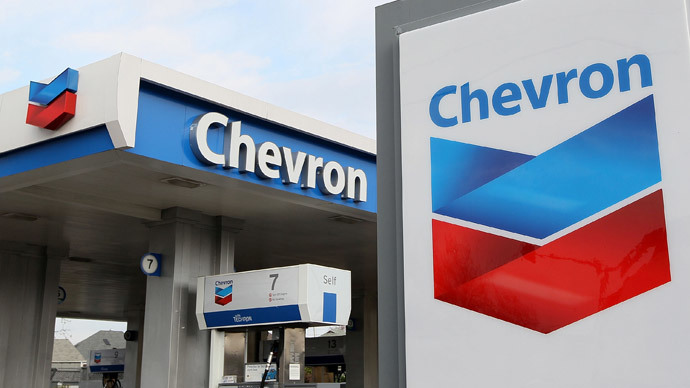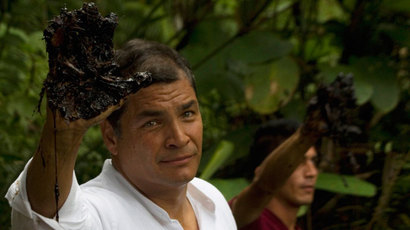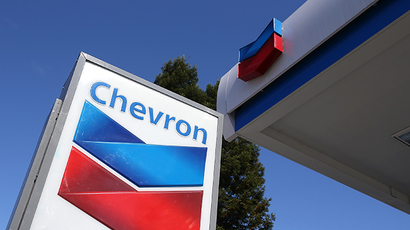$9.5bln dollar ‘Robin Hood’ judgment against Chevron corrupt – US judge

A $9.5 billion pollution judgment against Chevron in Ecuador was obtained by corrupt means, a US judge has ruled, blocking American courts from being used to collect on the historic settlement.
"Justice is not served by inflicting injustice. The ends do not justify the means," wrote US District Judge Lewis Kaplan.
Kaplan said he found "clear and convincing evidence" that attorney Steven Donziger, whose legal team represented the plaintiffs in the Lago Agrio case, had used bribery, fraud and extortion in pursuit of an $18 billion judgment against the oil company.
He said it would never be known whether the Ecuadorean villagers had a valid case in pursuing recompense for rainforest damage against the US oil giant, as the Ecuadorean court judgment had been “obtained by corrupt means."

"It is distressing that the course of justice was perverted," Kaplan wrote in a nearly 500-page ruling, saying a "Robin Hood" defense could not be used to justify illegal conduct.
“The defendants here may not be allowed to benefit from that in any way.”
Apart from keeping the villagers and their legal team from enforcing the ruling of the Ecuadorean court on US soil, the case will likely serve as a legal precedent to help Chevron fight off attempts to legally seize their assets in other countries.
Chevron has by and large divested itself of its Ecuadorian assets, prompting locals to seek recompense through the court systems of Argentina, Brazil, and Canada.
Chevron Chief Executive John Watson heralded the ruling as “a resounding victory."
Kaplan’s ruling is the latest twist in a decade’s long battle between indigenous people of the northeastern Ecuadorian province of Sucumbios and US oil majors.
Rain forest dwellers accused Texaco, later acquired by Chevron, of intentionally dumping 18 billion gallons of toxic oil waste into the Ecuadorian Amazon between 1964 and 1992. The area around the Lago Agrio oil field has become infamous for its ecological problems, with the rainforest being virtually destroyed, and catastrophic levels of oil pollution in some areas. Environmental activists blamed the pollutants for continued contamination of the water supply and a 150% spike in cancer cases in the community and region.

The rainforest has been all but obliterated in the area and environmental degradation is severe with catastrophic oil pollution. Chevron says it invested $40 million to clean up its share of the drilling contamination before relinquishing the site to a state-run oil company, and had thus absolved themselves of liability. Critics, however, contend the clean-up operation was superficial and residents had not relinquished their right to sue.
In February 2011, an Ecuadorean court ordered Chevron to pay $19 billion in damages to 30,000 residents behind the suit.
The Ecuadorean National Court of Justice, the country’s highest court, upheld the verdict this past November but reduced the judgment to $9.5 billion.
On October 13, Chevron opened a case accusing Donziger of racketeering and using fraudulent means to secure the multi-billion dollar judgment.
Donziger has accused Judge Kaplan of being biased, predicting beforehand he would lose the case. He called Tuesday’s ruling "appalling" and blamed Kaplan's "implacable hostility" toward him and his clients.
“Through this decision, we now have the spectacle of a Manhattan trial judge purporting to overrule Ecuador's Supreme Court on questions of Ecuadorean law," Reuters cites him as saying in a written statement.
Donziger said he will seek an expedited appeal of "an appalling decision resulting from a deeply flawed proceeding." He further vowed to continue seeking to enforce the judgment in other countries.
The Embassy of Ecuador in the US, which noted that the state of Ecuador is not a party to the suit, said the ruling "does not exonerate Chevron from its own legal and moral responsibilities resulting from its decades of contamination of the rainforest that has endangered the lives, culture, and environment of countless poor, indigenous people."
Meanwhile, the legal battle is likely to rage on for some time.
On September 18, The Hague’s Permanent Court of Arbitration decided Ecuador lawfully released Chevron from pollution liability. Before The Hague’s ruling, Ecuadorian Foreign Minister Ricardo Patino Roca warned an unfavorable ruling against Ecuador could force it into bankruptcy, as the $19 billion settlement is almost 20 percent of Ecuador’s GDP.
In December, however, an Ontario appeals court ruled they can seek enforcement of the judgment in Canadian courts.














